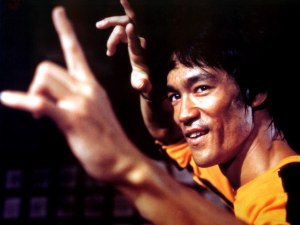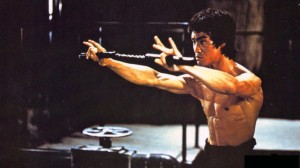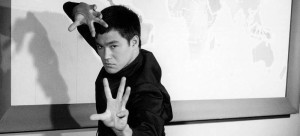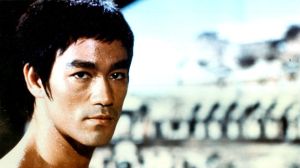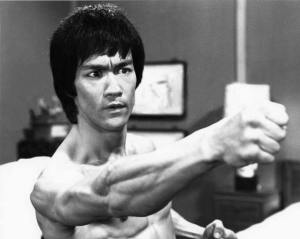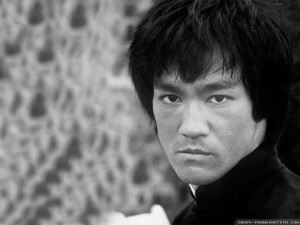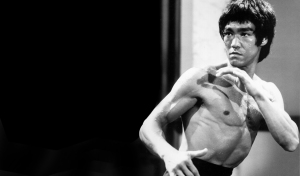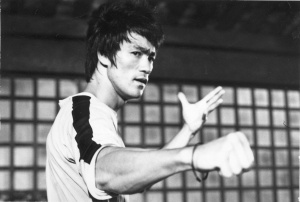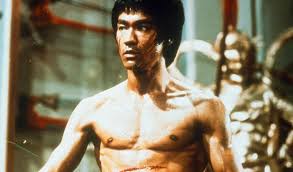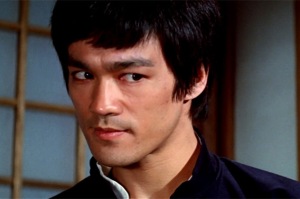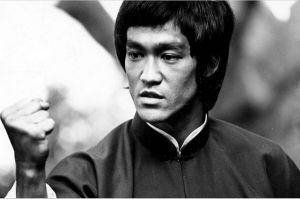He is Bruce Lee. He was was a Hong Kong American martial artist, Hong Kong action film actor, martial arts instructor, filmmaker, and the founder of Jeet Kune Do. Lee was the son of Cantonese opera star Lee Hoi-Chuen. He is widely considered by commentators, critics, media and other martial artists to be one of the most influential martial artists of all time, and a pop culture icon of the 20th century. He is often credited with helping to change the way Asians were presented in American films.
Lee was born in Chinatown, San Francisco on November 27, 1940 to parents from Hong Kong and was raised in Kowloon with his family until his late teens. He was introduced to the film industry by his father and appeared in several films as a child actor. Lee moved to the United States at the age of 18 to receive his higher education, at the University of Washington, and it was during this time that he began teaching martial arts. His Hong Kong and Hollywood-produced films elevated the traditional Hong Kong martial arts film to a new level of popularity and acclaim, sparking a surge of interest in Chinese martial arts in the West in the 1970s. The direction and tone of his films changed and influenced martial arts and martial arts films in the United States, Hong Kong and the rest of the world.
He is noted for his roles in five feature-length films: Lo Wei‘s The Big Boss (1971) and Fist of Fury (1972); Golden Harvest‘s Way of the Dragon (1972), directed and written by Lee; Golden Harvest and Warner Brothers‘ Enter the Dragon (1973) and The Game of Death (1973), both directed by Robert Clouse. Lee became an iconic figure known throughout the world, particularly among the Chinese, as he portrayed Chinese nationalism in his films. He trained in the art of Wing Chun and later combined his other influences from various sources, in the spirit of his personal martial arts philosophy, which he dubbed Jeet Kune Do (The Way of the Intercepting Fist). Lee held dual nationality of Hong Kong and the United States. He died in Kowloon Tong on July 20, 1973 at the age of 32.
On May 10, 1973, Lee collapsed in Golden Harvest studios in Hong Kong while doing dubbing work for the movie Enter the Dragon. Suffering from seizures and headaches, he was immediately rushed to Hong Kong Baptist Hospital where doctors diagnosed cerebral edema. They were able to reduce the swelling through the administration of mannitol. These same symptoms that occurred in his first collapse were later repeated on the day of his death.
On July 20, 1973, Lee was in Hong Kong, to have dinner with James Bond star George Lazenby, with whom he intended to make a film. According to Lee‘s wife Linda, Lee met producer Raymond Chow at 2 p.m. at home to discuss the making of the film Game of Death. They worked until 4 p.m. and then drove together to the home of Lee‘s colleague Betty Ting Pei, a Taiwanese actress. The three went over the script at Ting‘s home, and then Chow left to attend a dinner meeting.
Later Lee complained of a headache, and Ting gave him an analgesic (painkiller), Equagesic, which contained both aspirin and the muscle relaxant meprobamate. Around 7:30 p.m., he went to lie down for a nap. When Lee did not turn up for dinner, Chow came to the apartment, but could not wake Lee up. A doctor was summoned, who spent ten minutes attempting to revive him before sending him by ambulance to Queen Elizabeth Hospital. Lee was dead by the time he reached the hospital.
There was no visible external injury; however, according to autopsy reports, his brain had swollen considerably, from 1,400 to 1,575 grams (a 13% increase). Lee was 32 years old. The only substance found during the autopsy was Equagesic. On October 15, 2005, Chow stated in an interview that Lee died from an allergic reaction to the muscle relaxant (meprobamate) in Equagesic, which he described as a common ingredient in painkillers. When the doctors announced Lee‘s death officially, it was ruled a “death by misadventure”.
Don Langford, Lee‘s personal physician in Hong Kong, had treated Lee during his first collapse. Controversy erupted when he stated, “Equagesic was not at all involved in Bruce’s first collapse”.
Donald Teare, a forensic scientist recommended by Scotland Yard who had overseen over 1,000 autopsies, was assigned to the Lee case. His conclusion was “death by misadventure” caused by an acute cerebral edema due to a reaction to compounds present in the combination medication Equagesic.
The preliminary opinion of Peter Wu, the neurosurgeon who treated Lee during his first seizure, was that the cause of death should have been attributed to either a reaction to cannabis or Equagesic. However, Wu later backed off from this position, stating that:
Professor Teare was a forensic scientist recommended by Scotland Yard; he was brought in as an expert on cannabis and we can’t contradict his testimony. The dosage of cannabis is neither precise nor predictable, but I’ve never known of anyone dying simply from taking it.
At the 1975 San Diego Comic-Con convention, Bruce Lee‘s friend Chuck Norris attributed it to a reaction between the medication he had been taking since 1968 for a ruptured disk in his back and the medication he was given for his headache on the night of his death.
Lee‘s wife Linda returned to her hometown of Seattle, and had him buried at lot 276 of Lakeview Cemetery. Pallbearers at his funeral on July 31, 1973 included Taky Kimura, Steve McQueen, James Coburn, Chuck Norris, George Lazenby, Dan Inosanto, Peter Chin, and Lee‘s brother Robert.
Lee‘s iconic status and untimely demise fed many theories about his death, including murder involving the Triads and a supposed curse on him and his family. There is also a theory that Bruce Lee used electrical muscle stimulation and that may have exacerbated or resulted in his condition.
To know more about Burce Lee, just go here: http://www.brucelee.com/
